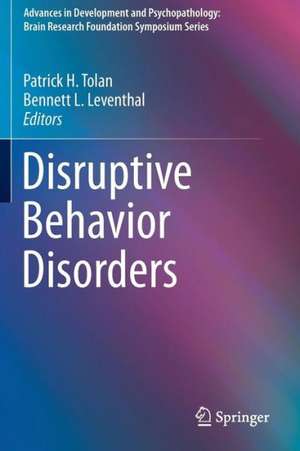Disruptive Behavior Disorders: Advances in Development and Psychopathology: Brain Research Foundation Symposium Series, cartea 1
Editat de Patrick H. Tolan, Bennett L. Leventhalen Limba Engleză Paperback – 15 feb 2014
Focusing on their most prevalent forms, Oppositional Defiant Disorder and Conduct Disorder, Disruptive Behavior Disorders advances the understanding of DBD on a number of significant fronts. Its neurodevelopmental emphasis within an ecological approach offers links between brain structure and function and critical environmental influences and the development of these specific disorders. The book's findings and theories help to differentiate DBD within the contexts of normal development, non-pathological misbehavior and non-DBD forms of pathology. Throughout these chapters are myriad implications for accurate identification, effective intervention and future cross-disciplinary study.
Key issues covered include:
- Gene-environment interaction models.
- Neurobiological processes and brain functions.
- Callous-unemotional traits and developmental pathways.
- Relationships between gender and DBD.
- Multiple pathways of familial transmission.
| Toate formatele și edițiile | Preț | Express |
|---|---|---|
| Paperback (1) | 636.80 lei 6-8 săpt. | |
| Springer – 15 feb 2014 | 636.80 lei 6-8 săpt. | |
| Hardback (1) | 643.00 lei 6-8 săpt. | |
| Springer – 10 iul 2013 | 643.00 lei 6-8 săpt. |
Preț: 636.80 lei
Preț vechi: 749.19 lei
-15% Nou
Puncte Express: 955
Preț estimativ în valută:
121.85€ • 127.90$ • 101.14£
121.85€ • 127.90$ • 101.14£
Carte tipărită la comandă
Livrare economică 10-24 aprilie
Preluare comenzi: 021 569.72.76
Specificații
ISBN-13: 9781493907502
ISBN-10: 1493907506
Pagini: 211
Ilustrații: X, 211 p. 2 illus.
Dimensiuni: 155 x 235 x 22 mm
Greutate: 0.32 kg
Ediția:2013
Editura: Springer
Colecția Springer
Seria Advances in Development and Psychopathology: Brain Research Foundation Symposium Series
Locul publicării:New York, NY, United States
ISBN-10: 1493907506
Pagini: 211
Ilustrații: X, 211 p. 2 illus.
Dimensiuni: 155 x 235 x 22 mm
Greutate: 0.32 kg
Ediția:2013
Editura: Springer
Colecția Springer
Seria Advances in Development and Psychopathology: Brain Research Foundation Symposium Series
Locul publicării:New York, NY, United States
Public țintă
ResearchCuprins
Foreword; Richard Kohn.- 1. Introduction: Connecting Brain Development, Disruptive Behavior and Children; Patrick H. Tolan, Bennett L. Leventhal.- 2. Influences of Gene Environment Interaction Correlation on Disruptive Behavior in the Family Context; Kristine Marceau, Jenae M. Neiderhiser.- 3. Neurobiology of Disruptive Behavior: A Developmental Perspective and Relevant Findings; Elizabeth J. Susman, Seth Pollak.- 4. Callous-Unemotional Traits and Developmental Pathways to the Disruptive Behavior Disorders; Paul J. Frick, R. James Blair, F. Xavier Castellanos.- 5. A Multidimensional Approach to Disruptive Behaviors: Informing Lifespan Research From An Early Childhood Perspective; Alice S. Carter, Sarah A. O. Gray, Raymond H. Baillargeon, Lauren S. Wakschlag.- 6. Gender and the Development of Aggression, Disruptive Behavior and Delinquency from Childhood to Early Adulthood; Rolf Loeber, Deborah M. Capaldi, Elizabeth Costello.- 7. Tracking the Multiple Pathways of Parent and Family Influence on Disruptive Behavior Disorders; Patrick H. Tolan, Kenneth Dodge, Michael Rutter.- 8. Advancing Our Understanding and Interventions for Disruptive Behavior Disorders; Patrick H. Tolan, Bennett L. Leventhal.
Notă biografică
Patrick H. Tolan, PhD, is Professor of Education and of Psychiatry and Neurobehavioral Sciences at the University of Virginia where he is Director of Youth-Nex: The UVA Center to Promote Effective Youth Development. Youth-Nex is a cross-university, multidisciplinary center to advance prevention of problems affecting youth and to promote healthy development. Prior to starting this center in August 2009, Dr. Tolan directed the Institute for Juvenile Research at the University of Illinois for the prior 10 years, a multidisciplinary center of 50+ faculty focused on child and adolescent mental health, where he was Professor in the Department of Psychiatry and the School of Public Health. He is now Emeritus Professor at the University of Illinois.
Dr. Tolan completed his BA at Temple University and his masters and doctoral degrees in Psychology from the University of Tennessee. He was a postdoctoral fellow in Clinical Research in Adolescence at the University of Chicago.
For the past twenty-five years he has conducted research with multiple collaborators on an ecological-developmental understanding of youth with much of that work focused on high-risk communities and carried out through randomized trials. He also focuses on promoting use of empirically tested approaches to promote child and adolescent mental health.
Dr. Tolan is a fellow of 5 divisions of American Psychological Association, of the Society for Research in Aggression, and of the Society for Experimental Criminology. In 2007 he was awarded the Star of Science award from the Children’s Brain Research Foundation and in 2008 received a Presidential Citation from the American Psychological Association.
Bennett Leventhal, MD, is Deputy Director of the Nathan S. Kline Institute for Psychiatric Research. He is also Professor in the Department of Disability and Human Development at the University of Illinois, Chicago, Irving B. Harris Professor of Child andAdolescent Psychiatry, Emeritus at The University of Chicago and Professor of Psychiatry at Yonsei University, Seoul, South Korea.
Dr, Leventhal received his medical degree from Louisiana State University School of Medicine in New Orleans and, subsequently, completed his General Psychiatry as well as Child and Adolescent Psychiatry training at Duke University. Dr. Leventhal was at The University of Chicago Department of Psychiatry; there he served as Professor of Psychiatry & Pediatrics and, as Director of Child and Adolescent Psychiatry for more than two decades. Dr. Leventhal then moved to the University of Illinois College of Medicine and the Institute for Juvenile Research where he was Professor of Psychiatry and Director of the Center for Child Mental Health and Developmental Neuroscience.
Dr. Leventhal board certified in both General Psychiatry and Child and Adolescent Psychiatry, a Distinguished Life Fellow of the American Psychiatric Association and Distinguished Fellow of the American Academy of Child and Adolescent Psychiatry. Dr. Leventhal has an international reputation as a child and adolescent psychiatrist, recognized for his leadership and expertise in fostering scientific career development, training and broad-based collaborative research networks that span from molecular genetics to community service and public health. Dr. Leventhal’s research focuses on disruptions in brain development that interfere with social functioning, including the molecular genetics of autism and the prenatal origins of disruptive behavior disorders as well as pediatric psychopharmacology, bullying, epidemiology and treatment of autism.
Dr. Leventhal is the recipient of numerous awards, including the American Academy of Child and Adolescent Psychiatry George Tarjan Award, the Edithe J. Levitt Award for Distinguished Service from the National Board of Medical Examiners and the Star of Science Award from the Children’s Brain Research.
Dr. Tolan completed his BA at Temple University and his masters and doctoral degrees in Psychology from the University of Tennessee. He was a postdoctoral fellow in Clinical Research in Adolescence at the University of Chicago.
For the past twenty-five years he has conducted research with multiple collaborators on an ecological-developmental understanding of youth with much of that work focused on high-risk communities and carried out through randomized trials. He also focuses on promoting use of empirically tested approaches to promote child and adolescent mental health.
Dr. Tolan is a fellow of 5 divisions of American Psychological Association, of the Society for Research in Aggression, and of the Society for Experimental Criminology. In 2007 he was awarded the Star of Science award from the Children’s Brain Research Foundation and in 2008 received a Presidential Citation from the American Psychological Association.
Bennett Leventhal, MD, is Deputy Director of the Nathan S. Kline Institute for Psychiatric Research. He is also Professor in the Department of Disability and Human Development at the University of Illinois, Chicago, Irving B. Harris Professor of Child andAdolescent Psychiatry, Emeritus at The University of Chicago and Professor of Psychiatry at Yonsei University, Seoul, South Korea.
Dr, Leventhal received his medical degree from Louisiana State University School of Medicine in New Orleans and, subsequently, completed his General Psychiatry as well as Child and Adolescent Psychiatry training at Duke University. Dr. Leventhal was at The University of Chicago Department of Psychiatry; there he served as Professor of Psychiatry & Pediatrics and, as Director of Child and Adolescent Psychiatry for more than two decades. Dr. Leventhal then moved to the University of Illinois College of Medicine and the Institute for Juvenile Research where he was Professor of Psychiatry and Director of the Center for Child Mental Health and Developmental Neuroscience.
Dr. Leventhal board certified in both General Psychiatry and Child and Adolescent Psychiatry, a Distinguished Life Fellow of the American Psychiatric Association and Distinguished Fellow of the American Academy of Child and Adolescent Psychiatry. Dr. Leventhal has an international reputation as a child and adolescent psychiatrist, recognized for his leadership and expertise in fostering scientific career development, training and broad-based collaborative research networks that span from molecular genetics to community service and public health. Dr. Leventhal’s research focuses on disruptions in brain development that interfere with social functioning, including the molecular genetics of autism and the prenatal origins of disruptive behavior disorders as well as pediatric psychopharmacology, bullying, epidemiology and treatment of autism.
Dr. Leventhal is the recipient of numerous awards, including the American Academy of Child and Adolescent Psychiatry George Tarjan Award, the Edithe J. Levitt Award for Distinguished Service from the National Board of Medical Examiners and the Star of Science Award from the Children’s Brain Research.
Textul de pe ultima copertă
Aggressive behavior among children and adolescents has confounded parents and perplexed professionals—especially those tasked with its treatment and prevention—for countless years. As baffling as these behaviors are, however, recent advances in neuroscience focusing on brain development have helped to make increasing sense of their complexity.
Focusing on their most prevalent forms, Oppositional Defiant Disorder and Conduct Disorder, Disruptive Behavior Disorders advances the understanding of DBD on a number of significant fronts. Its neurodevelopmental emphasis within an ecological approach offers links between brain structure and function and critical environmental influences and the development of these specific disorders. The book's findings and theories help to differentiate DBD within the contexts of normal development, non-pathological misbehavior, and non-DBD forms of pathology. Throughout these chapters are myriad implications for accurate identification, effective intervention, and future cross-disciplinary study.
Key issues covered include:
Focusing on their most prevalent forms, Oppositional Defiant Disorder and Conduct Disorder, Disruptive Behavior Disorders advances the understanding of DBD on a number of significant fronts. Its neurodevelopmental emphasis within an ecological approach offers links between brain structure and function and critical environmental influences and the development of these specific disorders. The book's findings and theories help to differentiate DBD within the contexts of normal development, non-pathological misbehavior, and non-DBD forms of pathology. Throughout these chapters are myriad implications for accurate identification, effective intervention, and future cross-disciplinary study.
Key issues covered include:
- Gene-environment interaction models.
- Neurobiological processes and brain functions.
- Callous-unemotional traits and developmental pathways.
- Relationships between gender and DBD.
- Multiple pathways of familial transmission.
Caracteristici
Provides cutting-edge analyses of research in disruptive behavior disorders Offers guidelines for future research and treatment in disruptive behavior and conduct disorder Features contributions from leading global experts in developmental psychology Strong synthesis across a broad range of mental health topics and issues involving disruptive behavior Translational Science" in action – Disruptive Behavior Disorders translates significant scientific research into guides for practice Includes supplementary material: sn.pub/extras
















